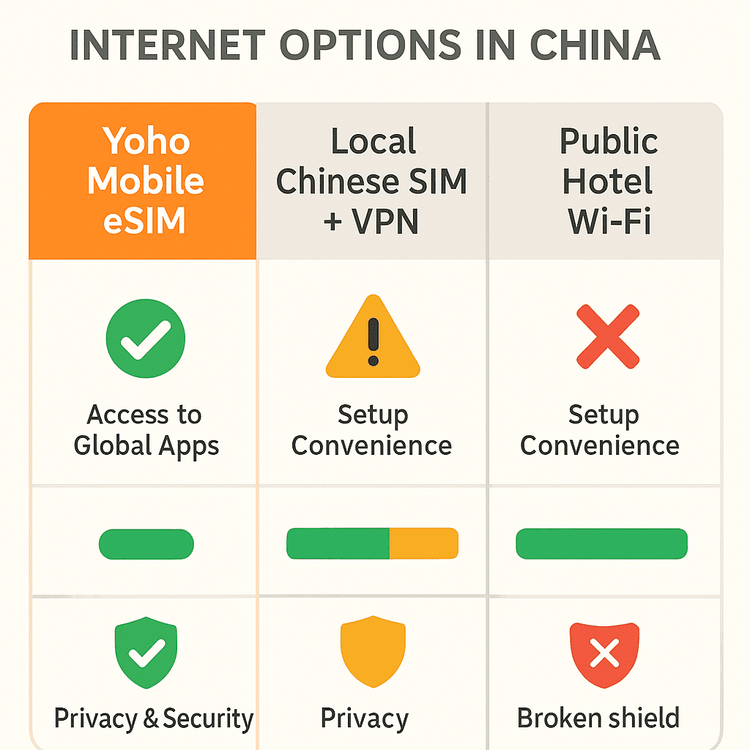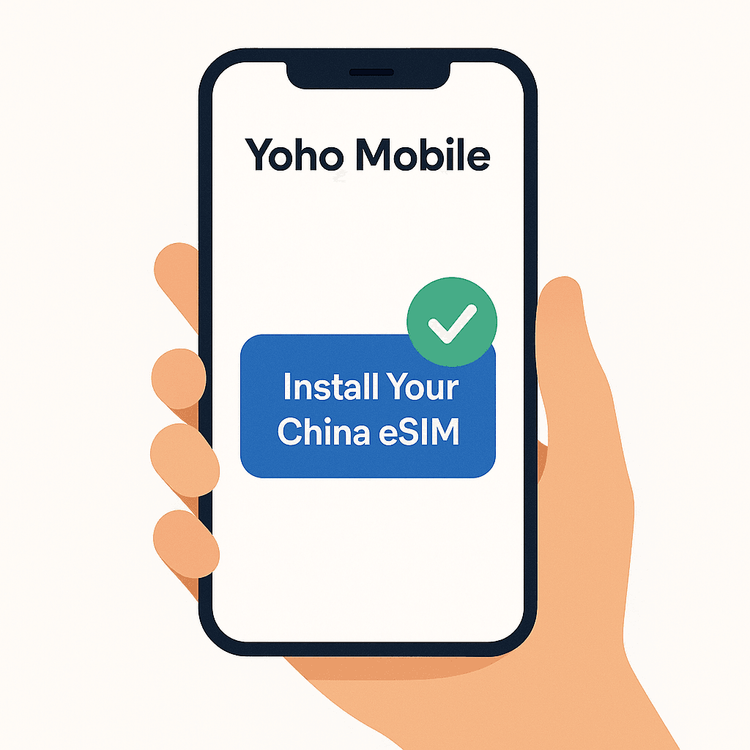Navigating the digital landscape in China can feel like a daunting task for any traveler. With the “Great Firewall” restricting access to many popular global apps and websites, the question of how to stay connected is paramount. For years, the standard advice was simple: get a VPN. But with the rise of eSIM technology, is that still the case?
This guide dives into the realities of internet access for tourists in China in 2025. We’ll break down how travel eSIMs work, whether they replace the need for a VPN, and how you can ensure seamless, unrestricted internet from the moment you land. Ready to simplify your travel tech? Explore Yoho Mobile’s flexible eSIM plans for China today.

What is the Great Firewall of China?
Before we talk about the solution, let’s understand the problem. The Great Firewall of China (GFW) is the unofficial name for the country’s sophisticated internet censorship and surveillance system. It’s managed by the Chinese government to regulate the internet domestically.
For travelers, this means many of the services you use daily are inaccessible. This includes:
- Social Media: Facebook, Instagram, X (formerly Twitter), Threads
- Messaging Apps: WhatsApp, Telegram, Signal
- Search Engines: Google, DuckDuckGo
- News & Information: The New York Times, BBC, Wikipedia
- Streaming & Tools: YouTube, Netflix, Google Docs, Dropbox
Attempting to access these services on a local network (like hotel Wi-Fi or with a local Chinese SIM card) will result in a connection error. This is why, traditionally, a Virtual Private Network (VPN) was essential to bypass these blocks.
How Travel eSIMs Provide a Smart Workaround
Here’s where modern technology changes the game. A travel eSIM, like those from Yoho Mobile, doesn’t connect you to the internet through local Chinese infrastructure in the same way a local SIM does. Instead, it works by “roaming” on local Chinese networks (like China Mobile or China Unicom) but routing all your internet traffic through servers located outside of mainland China.
Think of it as having a built-in, secure tunnel for your data. Because your traffic is processed in a region without these internet restrictions (e.g., Hong Kong or Singapore), it completely bypasses the Great Firewall. The result? You can open Instagram, check your WhatsApp messages, and search on Google as if you were never in China. For most travelers, the right eSIM is the VPN.
The Verdict: Do You Need a VPN with an eSIM in 2025?
For the vast majority of tourists and business travelers, the answer is no. If you use a reputable travel eSIM provider like Yoho Mobile, you will have unrestricted access to the global internet without needing to install or run a separate VPN application.
This approach offers several advantages over the traditional VPN method:
- Simplicity: No need to download, configure, or troubleshoot a VPN app, which can often be unreliable in China.
- Instant Connection: Your phone works correctly from the moment you land and switch on your eSIM.
- Reliability: It’s a more stable solution, as the routing is handled by the carrier, not a third-party app that could be blocked.

When a VPN Might Still Be a Good Idea
While a travel eSIM solves the Great Firewall problem, there are a couple of niche scenarios where a VPN could still be useful:
- Accessing Geo-Restricted Home Content: If you want to watch a streaming service that’s only available in your home country (like a specific Netflix library or your local sports broadcaster), a VPN allows you to set your location back home.
- Enhanced Security on Public Wi-Fi: While cellular data from an eSIM is secure, you might still use public Wi-Fi at your hotel, cafes, or airports. A VPN encrypts your connection on these potentially insecure networks, protecting your data from prying eyes.
For these specific needs, having a VPN can be a good backup. However, for general internet access and using your favorite apps, your Yoho Mobile eSIM has you covered.
Choosing the Best eSIM for Your China Trip
Not all eSIMs are created equal. Here’s what makes Yoho Mobile the ideal choice for staying connected in China:
- Flexible Data Plans: Why pay for what you don’t need? With Yoho Mobile, you can create a custom plan with the exact amount of data and number of days for your trip. Whether it’s a 3-day business trip to Shanghai or a 3-week adventure across the country, you only pay for what you need.
- Yoho Care Protection: Worried about running out of data? Every Yoho Mobile plan comes with Yoho Care, which provides a safety net of basic connectivity even if your main data allowance is used up. You’ll never be truly disconnected.
- Effortless Installation: Especially for iOS users, getting started is a breeze. After purchase, simply tap the “Install” button in the app or email—no QR codes to scan or manual details to enter. You’ll be online within a minute.
Before you purchase, it’s always a good idea to check if your device is compatible on our official eSIM compatible device list.
Frequently Asked Questions (FAQ)
Can I use WhatsApp and Instagram in China with a Yoho Mobile eSIM?
Yes, absolutely. Because our eSIMs route your internet traffic outside of mainland China, you can use WhatsApp, Instagram, Google, Facebook, and all your other favorite apps freely, without needing a separate VPN.
What’s the best way for a tourist to get internet in China without a VPN?
The simplest and most reliable method in 2025 is using a travel eSIM from a provider like Yoho Mobile. It gives you immediate, unrestricted internet access upon arrival by bypassing the Great Firewall automatically. This is far more convenient than buying a local SIM and struggling with a VPN.
Does a travel eSIM for China automatically bypass the Great Firewall?
Yes, high-quality travel eSIMs are designed to do this. They establish a connection with local Chinese cell towers for signal but channel the data through international servers. This “data roaming” mechanism is the key to bypassing the GFW.
Will my phone work with an eSIM for China?
Most modern smartphones from Apple, Samsung, and Google Pixel support eSIM technology. However, it’s essential to confirm your specific model is on the eSIM compatible list and that your device is carrier-unlocked before you travel.

Conclusion: Travel Smarter, Not Harder
Traveling to China in 2025 doesn’t have to mean a digital detox. While the Great Firewall is a real hurdle for those using local internet, the solution is simpler and more integrated than ever. For seamless, unrestricted access to the global web, a travel eSIM is your all-in-one tool. It provides the freedom of a VPN without the hassle.
By choosing a flexible and reliable provider, you can focus on your travels, knowing that your connection to the world is stable and secure.
Ready for your trip to China? Browse Yoho Mobile’s customizable eSIM data plans now and travel with confidence.
